-
San Francisco Jewish Film Festival 2022
Last edited by Chris Knipp; 07-30-2022 at 11:52 PM.
-
A REEL WAR: SHALAL (Karnit Mandel 2021)
KARNIT MANDEL: A REEL WAR: SHALAL (2021)
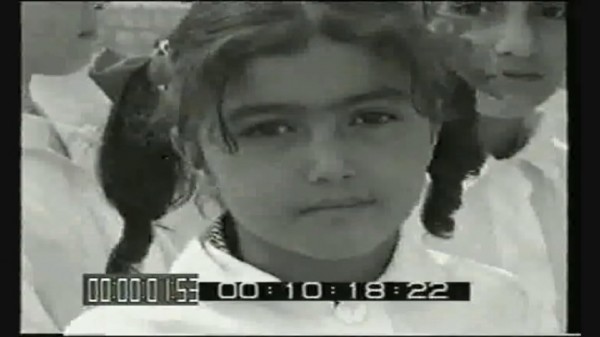
ARCHIVAL FOOTAGE STILL OF PRE-1948 PALESTINIAN STUDENT FROM A REEL WAR: SHALAL
Old film footage of Palestinians confiscated by Israelis represents stolen history and an attempt to erase memory
Another short documentary investigation film by a younger generation Israeli, Karnit Mandel, who made and stars in this film, who as a researcher in Israeli historical film files comes upon material different from the rosy picture of the establishment of the State of Israel that they received growing up. This time it is a collection of Palestinian films going back to before the State of Israel and during the time when villages were invaded and people driven out, and the refugee camps of Gaza began. Karnit interviews numerous people, 90% Jewish, inquiring about this material, and the impression is that there is a bigger file with the IDF, شلل "shalal" or confiscated material.
She calls the woman in charge of the IDF, the Israeli army, film files at an IDF office who plays hard to get and when finally reached claims it's an "urban myth" that they have a file of Palestinian films seized by the IDF, it was destroyed, it never existed, whatever.
One thing that stings is that one Israeli old-timer says, "At this time, you know, there were no Palestinians; the word was invented after 1964," or words to that effect. And the oldest Israeli "historian," is a man who compiled the standard photo book found "in every home" about the establishment of the State of Israel, who dodges the question by Karnit about his selecting photos for propaganda purposes. He says he didn't edit out Arabs because there were none, or hardly any, they were a small minority. No need.
Karnit Mandel is diligent, but she has questions, not answers, to present here. And the last word comes from Dr. Mustapha Kabha, Head of Middle Eastern Studies at Open University, says these Palestinian films that are hidden and confiscated rob the Palestinians of their identity, and if they don't want to return them, they should make them public. He asks how Israel can want to steal a history from a people after only 70 years when they pride themselves on remembering their own history for, well, several thousand years. "No attempt to erase a layer of memory ever succeeds," he concludes.
Another more final word is allowed former state archivist Jacob Lozowick, who feels no archive should be kept hidden beyond a certain period, certainly not after 70 years, and says he resigned because the forces for the status quo are stronger than "one lone archivist."
A Reel War: Shalal, 55 mins., in Hebrew, English, and Arabic, was screened for this review as part of the 2022 San Francisco Jewish Film Festival.
SFJFF SHOWTIMES:
Friday July 29, 2022
1:00 p.m.
Albany Twin
Last edited by Chris Knipp; 07-28-2022 at 05:54 PM.
-
AND I WAS THERE (Eran Paz 2020)
ERAN PAZ: AND I WAS THERE (2020)
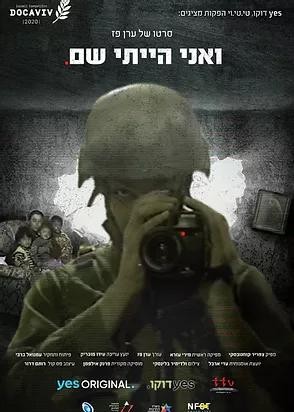
POSTER FOR AND I WAS THERE SHOWS PAZ IN 2002
Through footage he shot with video camera, an Israeli reexamines participating in house invasions as a soldier 20 years ago
Eighteen years later, Eran Paz finds a box of videotapes with footage he took of his squad in the West Bank during Operation Defensive Shield in 2002 when he was doing military service, and is horrified at the callousness of their behavior. Viewers may remember the 2008 (NYFF) film Waltz with Bashir about an Israeli solider who has difficulty remembering his part in a 1982 massacre.
This meandering film depicts Eran Paz (which in Hebrew means "gold," in Spanish of course "peace") after he finds the tapes. He goes to a place where specialists can play them and gets them digitalized, and a still image made of a Palestinian family of a dozen or more crowded by his unit into a single room in their house after breaking into it using a large axe. On such occasions they often took the adult men out, he says.
Paz is an artist and sets out to paint this crowded scene. He also reunites with some fellow soldiers and paints their portraits, interviewing them after showing them the tapes (or excerpts from them) on his smartphone. The first fellow unit member says that time was "fun" and an "adventure" (using the English word). He says he doesn't remember why they were there. Another fellow soldier says he now is "working with the Bedouin," which he thinks will be good for his daughter. He hopes he will be able to show Paz's footage to his children. He says he knows quite well why they were there, serving as a basic combat unit, and recalls that there were several serious casualties.
As other footage from the old films appears, the dialogue of the men on tape shows they regard basically all the Palestinians they encounter, the males particularly, as "f-ing terrorists," and a pregnant woman big with child as about to give birth to a "f-ing terrorist," and so one wonders, aloud why they are being "nice" to her by offering her water. They are part of a unit occupying the Palestinian town of Tulkarm.
At another moment we see footage of the unit hungrily eating while reports of casualties and calls for a doctor come over their radio. A third, big dark haired fellow vet Paz speaks to seems to have no memory about and no ability to articulate what happened. "It was, like, boom," he says. Maybe it's repressed, he admits.
A notable sequence is of the rave, in a room draped all around with ornate flowing pink floor-to-ceiling curtains. Two men looking into a big round mirror, and one says: "This is your photographer (Paz). And it may be the last time you see him alive, because he has taken a serious amount of LSD." The Palestinian family has been locked up in the next room. Someone says to lower the sound in case an officer comes, but the wildness continues. Later they speak, now, of being in a trance-like state at this time, an escape from the reality of where they are and what they are doing. One ex-soldier says he hated going into the houses. Why they did this, what was going on overall during this "operation" is never mentioned in Paz's film.
As the present time interviews, as Paz paints several fellow soldiers' portraits, intercutting these with sometimes very logically connected excerpts from the old footage, he begins to work on the idea of going back to a family they invaded and apologize to them. But he doesn't know Arabic (probably all Arabic know "sorry," but perhaps he doesn't know that. He looks up how to say it and finds "ana asifan" on Google.
Despite the misgivings of his wife and her concern for their three young children Paz goes to see the man in the foreground of the picture of the many people whose house his unit invaded. The house has been located and the man contacted. Paz goes to see the man with another man, whose face we are not allowed to see, understandably given on the way we see a sign that declares in Hebrew, Arabic, and English that they are entering territory belonging to the Palestinian Authority and to continue is "forbidden, dangerous, and illegal" for Israelis to come here.
The meeting is awkward, but moving. Paz speaks little English, and the man he visits may understand it but does not speak it, only Arabic; also, Paz, perhaps not the mensch he would like to be, lacks the courage at this moment to say exactly who he is, and only apologizes later on the phone. Here, he offers a gift of food, and they eat lunch together, with large spoons. The neighborhood is very crowded and poor. This is the same house, they see the same room, Paz shows the man the same photo. On the phone later, the man says, in Arabic, "I forgive you, I forgive you." Pretty elemental, powerful stuff. All of this is good raw material, some of it shocking and devastating in different ways. But there could be more perspective. Perhaps, as in Ari Folman's more detached and contemplative Waltz with Bachir, the years since the fighting by these then very young Israeli soldiers have been a time of forgetting, not contemplation. Jewish Film Review asks whether, "in the absence of anything else, might some view [Paz's] apology as hollow and his film uncomfortably self serving?" Certainly, this is only a beginning.
His Linkedin entry describes Eran Paz as "An award-winning documentary cinematographer with an open, wild and adventurous mind." It says he was "Awarded best director in the Jerusalem Festival for [his] film Jeremiah, and received praise and awards from around the world for [his] film And I Was There which aired on 'Yes'."
And I Was There,64 mins., Jan. 13, 2020 on yes docu at Dokaviv and was screened for this review as part of the 2022 San Francisco Jewish Film Festival.
SHOWTIMES SFJFF:
Monday August 1, 2022
12:01 a.m.
JFI Digital Screening Room
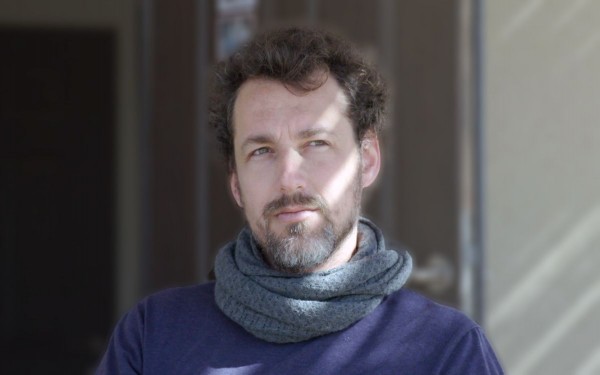
ERAN PAZ, RECENT PHOTO
Last edited by Chris Knipp; 07-22-2022 at 04:23 PM.
-
KARAOKE (Moshe Rosenthal 2022)
MOSHE ROSENTHAL: KARAOKE (2022)
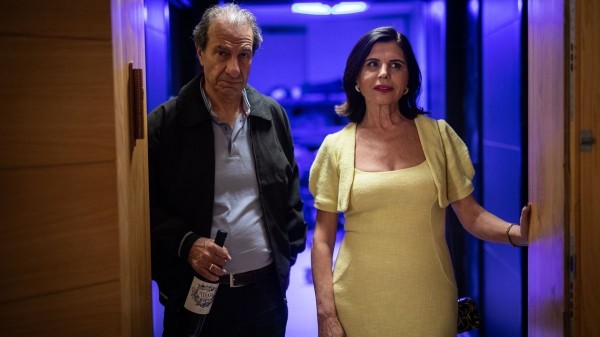
SASSON GABAY, RITA SHUKRUN IN KARAOKE
Life is unfair, but you get second chances
The setting of Karaoke is a beautiful apartment building in Tel Aviv, which affords views of other similar buildings around it that shimmer around it at night. The glass lobby is filled with sleek, lush looking plants, elegant but not too ostentatious. The couple in question, Meir and Tova, whose lives need an adrenalin rush, live in the same building as the glamorous Itzik; he's just higher up.
Really, is karaoke the medium of the ultimate mature swinger, a man with a penthouse apartment in a beautiful Tel Aviv apartment house, and a silver Maserati? Well, Israel is a sheltered (or more accurately barricaded) little country. . . But this oddity does not detract from the perception of Moshe Rosenthal's memorable feature debut. And ultimately we learn about the shallowness of this man's world, the emptiness of its glamour.
It's not fair, either: Lior Ashkenazi, the very well known actor who plays Izik is 53, and Sasson Gabay, who plays Meir, is 21 years older. Who cannot seem cooler and more of a swinger when they're that much younger, even if in their fifties? But they, like Rita Shukrun's Tova, are interesting to watch. We drink them in, their wrinkles and their edge. We study those faces to see what's there.
Despite some writers' assessment that Gabay comes off as a meek loser, this is not true. There's a dry sarcasm about him from the first. Confidence when he explains to his wife simply that a Maserati is "auto tova," "a nice car." He's not that impressed. Deep down, he's a mensch. But he has to find his inner mensch, which he does. That is the story of this film. It's about confidence. Not letting them get to you. It takes a while. True, Meir is seduced by Itzik's looks, his flash, his apparent charisma. But then Meir finds out he's been foolish. Itzik is just facade, and worse than that, he uses people, and undermines them, spoiling Tova's sexy Greek dancing that she's done just for him, suggesting Meir's life is paltry compared to his, as if a promoter is more important than a teacher.
Karoake is a simple, seemingly superficial film; there many other Israeli films whose social and psychological portraiture is richer than this. Nonetheless Rosenthal gets at self-worth in a penetrating way. This is like one of Hemingway's short stories where a man risks all to prove himself. There are such moments of truth. And they make wonderful, scintillating drama. I'd say Karaoke punches above it's apparent weight - but scores.
Karaoke, 103 mins., debuted at Tribeca Jun. 15, 2022. It will show at Jerusalem in July and was screened for this review at the San Francisco Jewish Film Festival where it was the opening night film, Jul. 21, 2022.
SHOWTIMES SFJFF:
Thursday July 21, 2022
6:30 p.m.
Castro Theatre
Last edited by Chris Knipp; 07-22-2022 at 03:25 PM.
-
GROSSMAN (Adi Arbel 2021)
ADI ARBl: GROSSMAN (2021)
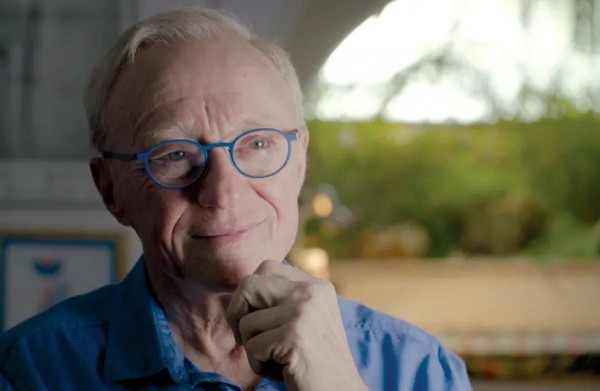
A prominent Israeli writer's life reviewed
The well-known Israeli writer David Grossman, now 68, is the star of this short documentary film about himself by filmmaker Adi Abel. Grossman is the author of See Under Love (1989), about the Holocaust, whose composition is described here. His 1991 A Book of Intimate Grammar is about a boy age age 11-15 growing up in a poor part of Jerusalem. A 1994 change of pace, a much more lighthearted coming of age tale, was Grossman's The Zigzag Kid, which won prizes in Italy. His fame spread when his 2017 novel about a repellant standup comic A Horse Walks Into a Bar won the International Man Booker prize, along with his frequent English translator, Jessica Cohen; in 2018 he received Israel's highest literary award. Another notable Grossman novel, Falling Out of Time, (2014) was a response to the death of his son Uri while serving in the Israeli military. There are a dozen fiction books in all, and five works of nonfiction. Four Israeli film adaptations have been made from Grossman novels. The method of this film is straightforward, with archival footage and plenty of narration drawn from multiple interviews with the author in which he talks about his life and work.
Grossman is first introduced when he recently met with a group of his translators in Croatia. His work has been translated into more than 40 languages. Addressing the camera later, he tells how as a child, not an ordinary boy (what writer is?), he was already a compulsive, fluent spinner of tales, and in recognition of this, once his teacher set him down in the schoolyard and said, "Tell a story." His parents and grandparents were of humble working class status. His father was a bus driver but later a librarian who brought him home books, including the stories of Sholom Aleichem, which he devoured. He developed a connection with Israeli radio early, going there even as a boy to act in plays, and later he got a regular job there. His army service was with intelligence, involving listening from high places. It was then that he met Michal, his wife of fifty years, whom we see then and hear from now. Grossman talks about how his obsessive work when writing must be difficult for family, since he describes it as like an illness that possesses him.
In the middle of the film's 54 minutes he talks about the occupied territories and himself, and he is glimpsed frequently visiting them, using his knowledge of Arabic to talk to Palestinians. His book The Yellow Wind (1987) was the result. Its pro-Palestinian views caused about 98% of the staff of the state radio to turn against him and for him to be fired from the Voice of Israel where he had worked for many years. He says he thinks this situation, the injustice of the status of Palestinians, can't continue. But it seems that an Israeli to go on living as he has, to be the writer he has been, he has generally had to set this issue to one side.
Grossman's two sons served in the military, as Israeli citizens usually must. He wrote a 2008 novel To the End of the Land about how Israeli parents suffer when their children are serving. We see footage of both sons, Yonatan and the younger, Uri, even a stunningly intelligent dialog with them as young children when they ask him searching philosophical questions. When Yonatan returns from military service, Uri signs up for a tank unit, where he dies, in 2006, in a fierce battle with forces of Hezbollah.
Grossman tells us the story of the writer, David Grossman, here. But the part of this film that is affecting for anybody, and not only for fans or those curious about his books, is how keenly it makes us feel the loss of his younger son and how that connects, even if not specifically mentioned, with the ongoing hostilities between Israel and the Palestinians. It is not that Grossman doesn't go deep about anything here. He talks about "touching life and death at the same time" and that as something he felt in talking to his sons that he continually seeks now when he writes. He speaks of his soul disintegrating when he writes. He is known for dealing with profound matters in his books and he doesn't shirk them here. What Adi Arbel achieves is a film where Grossman continually seems to be talking directly to us.
But an interview with the filmmaker published in The Jerusalem Post shows Grossman, the famous, multiple award winning author, has long been hard for journalists or interviewers to get hold of and had to be handled with kid gloves here. A certain element of blandness of this after all in some ways not-very-deep film biography is shown by how little it says about his politics. After all, according to the Wikipedia article about Grossman, "he has been described by The Economist as epitomizing Israel's left-leaning cultural elite." Well, what of that? In contrast to documentary filmmakers who make themselves the star, she says in the interview, she stays out of the picture. And that can be appreciated. But maybe she should have dared to intervene more.
Grossman, 54 mins., debuted at Docaviv documentary festival in Tel Aviv Jul. 2, 2021, and in Jun. 2022 at Biografilm festival in Italy. Screened for this review as part of the July 2022 San Francisco Jewish Film Festival.
SFJFF SHOWTIMES:
JFI Digital Screening Room
Monday, Aug 1, 2022 12:01 AM - Sunday, Aug 7, 2022 11:59 PM
Last edited by Chris Knipp; 07-23-2022 at 08:49 AM.
-
SPEER GOES TO HOLLYWOOD (Vanessa Lapa 2020)
VANESSA LAPA: SPEER GOES TO HOLLYWOOD (2020)
[Originally published Oct. 2021 at the time of US theatrical release]

ALBERT SPEER AT THE NUREMBERG TRIALS
An attempt to expose the slickest Nazi that fizzles
How did the most powerful Nazi in the Nuremberg trials become "the good Nazi"? This documentary delves into the details of his successful post-prison life. Well, sort of. In fact this documentary seems ineffectual and even an out-and-out mistake. Its ironies are at once too subtle and too obvious to be of much interest.
Vanessa Lapa made a previous documentary about Heinrich Himmler, The Decent One. When she was approached by Stanley Cohen, a man who was originally going to promote a film dramatizing the memoir of Albert Speer, the architect of the Third Reich, she has recounted that she couldn't face more exposure to the mind of evil, but eventually she was drawn into it.
The pretext for this film is 40 hours of tapes recording discussions between Andrew Birkin and Albert Speer in the early seventies. Cohen had bought the film rights of Speer's memoir. Paramount was interested. Hence these discussions.
Speer never went to Hollywood. The Birkin-Speer talks took place at Speer's home in Germany. Speer had evaded hanging at the Nuremberg trials and served 20 years at Spandau for his war crimes, then become famous and financially successful as "the good Nazi" for his books about the Third Reich whitewashing his role in it. Andrew Birkin, brother of Jane, then 25, was a protégé of Stanley Kubrick and cousin of Carol Reed, and Birkin was a young screenwriter. On the tapes they are going over the screenplay Birkin had composed dramatizing Speer's memoirs.
Lapa's idea was to recreate these discussions - degraded quality required that they be dubbed by other voices - and provide visuals that alternately illustrate and contradict Speer's claims as they go through a screenplay outline.
Lapa uses a wealth of archival material for this that shows Speer and his wife in their comfortable home alternating with images of Germany before and during the war and images of the Nuremberg trials, with special emphasis in the latter on Speer's behavior.
As before, at Nuremberg and in his memoirs, Speer dodges issues constantly. He tries to persuade Birkin to present him in a more innocent light, the man who claimed not to have known about the Nazi plan to exterminate the Jews, not to know about the death camps.
We get the outlines of Speer's remarkable rise to power from being a young, minor architect to a favorite of Hitler, and then when the chief or armaments Fritz Todt died in a plane crash, being chosen to replace him and thus become one of the most powerful figures in the Third Reich. It is now believed that Speer's falsification of his armament production and artificial increase of it, through slave labor of prisoners, was effective in extending the war and causing the deaths of millions of additional war victims when Speer knew early on, which he partially admits in these talks, that the war was lost and Germany would only be further destroyed. He acknowledges knowing horrible things were happening in the camps. He says he approved their introduction though, because the jails weren't big enough.
But Speer doesn't dramatically admit such a thing. On the contrary he smoothly covers it over, as was his way. There are some stunning admissions. He says, for instance, that he wasn't anti-Semitic; he just was disgusted by Jews and their money-grubbing ways. He had claimed not to have been present when Himmler made his notorious speech announcing that the Jews must be exterminated, claiming that he left the dinner early. But in the tapes he asks Birkin if it would be better for the movie if he was shown to have been there. The truth clearly is to be tweaked as the situation requires. He wavers on whether he was involved in the plot to kill Hitler. He describes visiting a shabby, worn down Hitler in the bunker to say goodbye and disapproves of his coldness on this occasion.
But so what? Some of this is mildly shocking; a surprise only if you're thoroughly ignorant of the Third Reich ;and of Speer. Tergiversations don't make very good dialogue. Birkin is mild, accommodating. His wishy-washiness is a strong hint that this project is doomed. He reminded me vaguely of Truffaut in the famous tapes interviewing Hitchcock, except that Speer, unlike Hitch, has nothing illuminating to say, nor does Birkin have truly penetrating questions. At some point both Kubrick and Reed are cited as warning Birkin that his screenplay supports Speer's lies or tergiversations and that if Speer doesn't admit his culpability this movie won't work. Indeed so.
Where is the illumination here? What we get is another, more suave and dodgy version of "the banality of evil" famously delineated in Hannah Arendt's famous 1963 New Yorker profile, "Eichmann in Jerusalem." Only Vanessa Lapa, dedicated and sincere though she clearly is, is no Hannah Arendt.
In her Variety review Jessica Kiang points out that the sound, the basic foreground of the film, is weakened in two major ways: by the stilted performances of Anno Koehler and Jeremy Portnoi, who voice the dialogue of Speer and Birkin, respectively; and by the unnecessary added sound effects to accompany historical footage, which creates an artificial "over-foleyed" effect. These things undermine the fine job Lapa has done in unearthing rare Third Reich-period footage of Speer in action. Kiang believes that this film is a good idea, but has failed in the execution. I am doubtful that it was even such a good idea. People who admire it seem to be seeing what they want to see - as they can because one can read different meanings into the ambiguous material.
Speer Goes to Hollywood, 97 mins., debuted at the Berlinale, as did Lapa's 2014 Himmler film The Decent One. It also showed at Moscow, Jerusalem and Telluride in Apr., Aug., and Sept. 2021 respectively. It opens theatrically Opens at Film Forum, New York, Oct. 29, 2021; at Laemmle Royal & Town Center, LA, Nov. 5. Republished here as part of the San Francisco Jewish Film Festival, July 21-Aug. 7, 2022.
SFJFF SHOWTIMES:
Schedule
Sunday July 31, 2022
11:30 a.m.
Albany Twin
Last edited by Chris Knipp; 07-22-2022 at 10:44 PM.
 Posting Permissions
Posting Permissions
- You may not post new threads
- You may not post replies
- You may not post attachments
- You may not edit your posts
-
Forum Rules





 Reply With Quote
Reply With Quote






Bookmarks